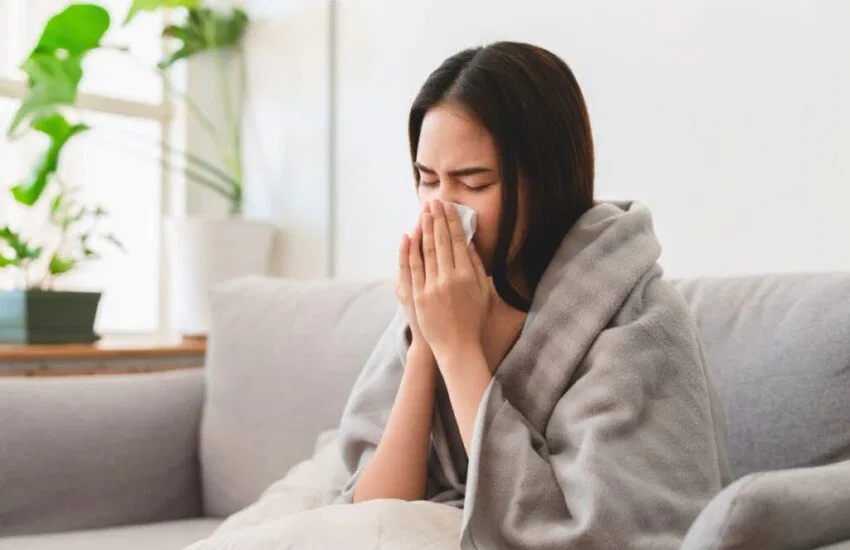Sickness: What’s Going Around In The U.S. Right Now?

Published July 25, 2025
Summer brings vacations and sunny days, but sickness doesn’t take a break. With measles resurging, new COVID-19 variants like “Nimbus,” and seasonal threats like West Nile virus and Lyme disease, there’s no shortage of sickness going around. Staying healthy is more important than ever. Stay aware and prepared to protect yourself.
In this article, we’ll dive into what’s behind the headlines, giving you insights into the latest sickness going around. Learn about these illnesses to protect yourself and others.
Current Widespread Illnesses In The U.S
Staying informed about what sickness is going around right now is vital for protecting your health and that of others. This summer, several illnesses are making headlines. Here’s a quick look at the key ones affecting Americans.
Measles
Measles is a highly contagious airborne disease. It has re-emerged this year with over 1,200 cases reported nationwide by July. The surge is mainly due to dwindling vaccination rates. Outbreaks in states like Texas and New York highlight the urgency of the issue. Symptoms include fever, cough, runny nose, conjunctivitis, and a red rash spreading from the face to the body.
The virus, which can remain on surfaces for up to two hours, primarily affects unvaccinated individuals. Health officials urge everyone, especially travellers, to stay up to date on the MMR vaccine.
COVID-19 “Nimbus” Variant (NB.1.8.1)
The COVID-19 “Nimbus” variant (NB.1.8.1) is now the dominant strain in the U.S., spreading rapidly in urban centers and southeastern states. Symptoms include fever, the distinctive “razor blade throat,” fatigue, and cough. About 30% of cases also experience nausea and diarrhea. It spreads through respiratory droplets. Hospitalizations have slightly increased, particularly in areas with low booster rates.

Lyme disease
Lyme disease is caused by the bacterium Borrelia burgdorferi. It’s transmitted by infected black-legged ticks, also known as deer ticks. Cases increase in summer due to more outdoor activities. It’s most common in the Northeast and Midwest. Early symptoms include a bull’s-eye rash, fever, chills, and fatigue. If untreated, it can cause joint pain. It may also lead to neurological issues and heart problems.
Lyme disease is not contagious. However, it’s spreading as tick populations grow. Warmer temperatures are driving this increase. The CDC recommends protective clothing and tick repellents for anyone spending time outdoors.
West Nile Virus
West Nile virus is spreading this summer, especially in California, Arizona, and Texas. Infected mosquitoes transmit the virus. Most people show no symptoms. Mild cases may cause fever, headache, and fatigue. Severe infections are rare. They can cause serious neurological issues like encephalitis or meningitis.
Mosquito activity peaks in July. Health agencies are ramping up control efforts. They urge everyone to use insect repellents to stop the spread.
Influenza (Flu)
Flu season usually peaks in winter. However, unseasonal flu activity has been reported this summer. This is likely due to changing seasonal patterns and interactions with other viruses. Common symptoms include fever, body aches, sore throat, congestion, and fatigue. The flu is now a leading cause of missed workdays this summer.
While cases remain lower than winter levels, clusters have been observed in southern states. Annual flu vaccinations remain a key preventive measure.
What Triggers These Infections?
The causes and transmission methods of common illnesses can differ significantly depending on the disease’s nature. Knowing how these illnesses spread can help you reduce your risk of infection and stop further transmission.
Here’s an overview of the major causes:
- Measles: Measles spreads through airborne droplets and can stay infectious on surfaces and in the air for up to two hours. Outbreaks often take place in areas with low vaccination rates, especially in group settings like schools. One infected individual can disseminate the virus to 9 out of 10 unvaccinated individuals.
- COVID-19 (Nimbus Variant): The “Nimbus” COVID-19 variant spreads easily. It transmits through respiratory droplets and airborne particles. Poorly ventilated spaces increase the risk. Crowded areas or regions with low booster uptake face higher risks, though surface transmission is less common.
- Lyme Disease: The condition is caused by Borrelia burgdorferi. It spreads through bites from infected black-legged ticks. These ticks are found in wooded or grassy areas. It isn’t transmitted person-to-person and typically requires a tick to remain attached for 36-48 hours to spread the bacteria.
- West Nile Virus: West Nile virus spreads via mosquito bites. Infections peak during summer. High temperatures increase the risk. Stagnant water boosts mosquito breeding. Human transmission is rare, limited to blood transfusions or organ transplants.
- Influenza (Flu): The flu spreads through respiratory droplets and contaminated surfaces. It thrives seasonally but can appear in warmer months. Schools, offices, and public spaces are typical transmission hotspots.
How To Protect Yourself From Sickness Going Around
Staying healthy means taking proactive steps. With numerous sickness going around, simple steps can help protect you. Stay healthy and boost your well-being.

Hygiene And Safety Habits
Simple hygiene habits can help prevent infections:
- Wash Hands Regularly: Use soap and water for 20 seconds or hand sanitizer with 60% alcohol.
- Avoid Touching Your Face: Prevent germs from entering through your nose, eyes, or mouth.
- Disinfect Surfaces: Clean high-touch areas like doorknobs and phones frequently.
- Wear a Mask When Needed: Use masks, like N95s, in crowded spaces or during illness outbreaks.
- Cover Coughs/Sneezes: Utilize a tissue or your elbow and sanitize it after.
These small steps protect you and those around you.
The Role Of Probiotics In Immune Support
Maintaining good gut health is essential for overall well-being, including a strong immune system. Probiotics, or “good bacteria,” help balance your gut microbiome and support infection resistance.
- Food Sources: Eat fermented foods for natural probiotics. Try yogurt, kefir, sauerkraut, kimchi, or kombucha.
- Supplements: If needed, try probiotic supplements with strains like Lactobacillus or Bifidobacterium. Targeted probiotics like Bionaze, which support ENT health, may offer added protection during times of high illness transmission.
- Prebiotics: Boost probiotics with prebiotics. Eat foods like bananas, garlic, and onions for better results.
- Stay Consistent: Make probiotics part of your daily routine to strengthen your immune system.
Vaccination And Preventive Care Tips
Vaccinations are a powerful way to protect yourself and your community from illnesses like measles, flu, and COVID-19. Here’s how to stay safe:
- Stay Up to Date: Keep current with vaccines like the flu shot, COVID boosters, and measles, mumps, and rubella (MMR) vaccine. Unsure? Check with your doctor.
- Seasonal Awareness: Illness risks during colder months. Ask about relevant immunizations.
- Travel Smart: Heading abroad? Ensure you’re protected with vaccines for diseases like typhoid or yellow fever.
- Follow Guidelines: Stay informed with updates from trusted sources like the CDC or WHO.
When To Seek Medical Attention
Understanding when to see a medical professional is essential. Here’s when to act quickly:
- Severe or Persistent Symptoms: Fever over 3 days, severe breathing issues, constant vomiting, or dehydration need immediate care.
- High-Risk Groups: Pregnant, elderly, or immunocompromised? Consult a doctor even for minor symptoms.
- Tick/Mosquito Exposure: Watch for rashes, flu-like symptoms, or joint pain after outdoor activity.
- Post-Travel Symptoms: Share travel history with your doctor if unexplained symptoms arise.
- Telehealth Options: Use virtual consultations for non-urgent symptoms or advice.
Frequently Asked Questions
How do I know if my symptoms are severe?
Recognizing serious symptoms helps determine when to seek medical care. Watch for:
- High or prolonged fever (over 103°F or lasting 3+ days)
- Breathing issues, like shortness of breath or chest pain
- Unusual rashes, such as bull’s-eye shapes or widespread blotches
- Severe fatigue, weakness, or inability to stay awake
- Persistent vomiting or diarrhea lasting over 48 hours
- Red flags like confusion, slurred speech, chest tightness, or coughing up blood
If symptoms get worse, appear suddenly, or affect daily life, see a healthcare provider right away.
Should I get tested for COVID-19 again?
Get tested for COVID-19 if you were exposed to a confirmed case. Test if you have symptoms like fever or cough, common with the “Nimbus” variant. Testing is also vital before travel or crowded events. Testing helps prevent the spread and protect public health. Follow local guidelines and consider at-home rapid tests for convenience.
Can I still catch the flu in summer?
Flu is more common in colder months. However, it can still occur in summer. This is especially true in crowded spaces or for vulnerable groups like infants and older adults. Simple steps can help reduce the risk year-round. Wash your hands, avoid sick individuals, and stay up to date on vaccinations.
What are the best immune-boosting supplements?
Specific nutrients can support immune health when paired with a balanced diet and healthy lifestyle. Key options include:
- Vitamin C: Boosts white blood cells and lessens cold severity. Found in citrus fruits, bell peppers, and strawberries.
- Vitamin D: Augments immune response and minimizes inflammation. Supplementation is often necessary in low-sunlight areas.
- Zinc: Supports immune cell production and can shorten colds. Found in meat, shellfish, and legumes.
- Probiotics: Strengthen immunity by promoting healthy gut bacteria. Found in yogurt, kefir, and sauerkraut.
- Elderberry: May reduce cold and flu symptoms by stimulating the immune system.
- Echinacea: Potentially helps shorten colds when taken early, though research is mixed.
Consult a healthcare professional before trying supplements, especially if you’re pregnant or taking medication. Combine with a healthy diet, exercise, and rest for the best results.

Staying Ahead Of The Sickness: Be Informed, Be Prepared
Staying proactive and informed is essential for health and disease prevention, especially with the numerous sickness going around lately. Stay informed about illnesses like the COVID-19 “Nimbus” variant, measles, and tick-borne diseases. Practice prevention with handwashing, a nutritious diet, and staying updated on vaccinations. Recognize symptoms early, seek medical guidance, and use virtual healthcare when needed. Small proactive steps and healthy habits protect both you and your community.
Want to give your immune system extra support? Bionaze offers targeted probiotic blends developed to help protect against ear, nose, and throat infections—especially useful when there’s sickness going around. Supported by scientific evidence and widely trusted, this simple addition to your wellness routine can significantly enhance your overall health.
Try Bionaze today and stay one step ahead of seasonal threats.
Benefit From The Latest Advancements In Probiotic Science With Bionaze
Bionaze is a proprietary blend of probiotics proven to promote ear, nose, and throat health, improve digestion, and support your immune system. The active ingredients BLIS K12, and BL-04 are considered among the best probiotics according to science.
Get 25% Off Your First Order when you use BIO25 at checkout!

This Content Has Been Reviewed For Factual Accuracy
This content has undergone thorough fact-checking by our team of internal experts. Learn more about the meticulous editorial standard for our website here.
ADVERTISEMENT

About The Author
Hi, I’m Corinne Grace, a proud nursing graduate from Riverside College with a flair for writing. I specialize in health and wellness topics, using my educational background to weave informative and attention-grabbing articles that appeal to a wide variety of readers.




